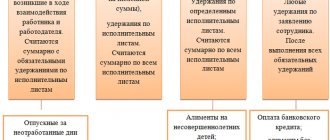Submitting documents to court
In 2021, the court may reduce the amount of the penalty or alimony arrears. This is done at the request of the alimony payer. Most often this happens if he is seriously ill or has a poor financial situation.
In addition, in 2021, the amount of the penalty for each day of delay has been reduced. Previously it was 0.5 percent, now it is 0.1 percent.
| Calculator of penalties and alimony debt: | |
| Amount of debt today: | rubles |
| Start date of delay: | |
| Until what date are penalties calculated? | |
Penalties at the rate of 0.1% per day for 0 days: 0 rubles
Amount of penalties for all debts: 0 rubles
Total amount of debt (penalty + principal): 0 rubles
If the child's father refuses to voluntarily pay child support for his children, you will have to protect their rights in court.
The simplest solution in this case would be to issue a court order. To do this, submit an application to the Magistrates' Court, indicating your requirements. This application will be reviewed within five days, after which a decision will be made.
If the child’s father does not object, then the court order will come into force and you can give it to the bailiffs for execution.
In the application, indicate your passport details and information about the defendant.
The application must also include information about your children. Don't forget to include a copy of your birth certificate and a copy of your marriage registration or divorce certificates.
If the child's father does not agree with the demands that you have made of him, the court order will be canceled. In this case, you will need to file a claim with the same court. Attach to it the same documents described above.
The trial of the case may last several months. After the decision is made, you can receive a writ of execution and give it to the bailiffs.
In 2021, for failure to pay child support, the court may deprive the father of parental rights, and the prosecutor may initiate a criminal case under Article 157 of the Criminal Code of the Russian Federation. They can be imprisoned for up to one year.
Procedure for collecting arrears of alimony
Collection of alimony and arrears thereof is carried out according to the following scheme:
- Before, during, or after a divorce, a woman files a lawsuit to recover child support payments in court. Based on the results, an IL is drawn up and handed over to the bailiffs.
- The bailiff initiates an individual entrepreneur and notifies the collector and the payer about this in writing.
- The debtor does not transfer money, the debt accumulates.
- The claimant turns to the bailiff for a ruling on debt settlement. If the specified amount is not satisfactory or a penalty needs to be collected, documents are submitted to the court.
If the payer does not comply with the requirements of the law on the payment of alimony, the bailiff has the right to put him on the wanted list and restrict the use of his driver’s license. The last resort is the seizure of property for sale to pay off the debt. It is used when the amount of debt is approximately equal to the value of the property.
Jurisdiction
An application for a resolution to settle the debt is submitted to the bailiff who initiated the proceedings. A statement of claim to determine the amount of debt and collect a penalty must be filed with the district or city court at the defendant’s place of residence (Article 28 of the Code of Civil Procedure of the Russian Federation).
Contents and sample of the statement of claim
What you need to indicate in the application:
- Name and address of the court.
- Full name, address, telephone number of the plaintiff.
- Full name, address of the defendant.
- Date and details of the document on the basis of which payments were collected (order, agreement, decision).
- Amount of alimony.
- Non-payment period (exact date).
- Details of the bailiff's resolution that determined the amount of the debt.
- Claims: to determine alimony debt in the amount (amount, rub.), to collect a penalty in the amount of (rub.).
- Description of submitted documents.
- Date and signature of the plaintiff.
Application for debt settlement
The application form can be downloaded from the official website of the FSSP or use a ready-made template. It must contain the following information:
- Name of the FSSP.
- Full name, bailiff position, date of initiation of IP, IP number.
- Full name of the creditor and debtor.
- Date of last payment of child support.
- For what period should the debt be calculated?
- Request for settlement of debt.
- Date of compilation and signature.
Sample application
Learn more about drawing up an application for calculation of alimony debt.
Debt and penalty
If the child's father does not fulfill the requirements specified by the court, the bailiffs must collect the debt from him. To do this, you need to multiply the number of months during which there were no payments by the amount of alimony. You can also add a penalty to the resulting amount. It is half a percent for each day of delay.
| Child support calculator | |
| How many children do you have under 18 years of age? | |
| Is the children's father officially employed? | |
| How much does the alimony payer receive? | rubles Error |
| The amount of other income of the alimony payer (for example, from renting out an apartment): | rubles Error |
| Alimony will range from 400 rubles to 13,000 rubles for each child. The judge will determine the exact size! If he is not registered with the employment center, then you need to file a claim and set alimony in a fixed amount. |
After this, take the resulting results and calculations to court. If everything was calculated correctly, the court will rule in your favor.
How is child support calculated?
The amount of alimony can be established in one of three ways permitted by law.
1. Notarial agreement of the parties (Article 100 of the RF IC). The parties themselves determine the amount of alimony, but it cannot be less than what would be due to the child in court (clause 2 of Article 103 of the RF IC). Therefore, in this case, the parents will not set 1-2 thousand rubles, even if they mutually want to.
2. Through the court as a percentage of earnings (Article 81 of the RF IC). Everything is simple here - the court sets a percentage according to the Family Code of all income from which alimony is paid. ¼ for one child, 33% for two children and half of earnings for three or more.
3. Through the court in a fixed sum of money (Article 83 of the RF IC). The court simply determines the amount of alimony in rubles, which is subsequently indexed to inflation. This amount is established taking into account the cost of living per child in a particular region, a multiple of the minimum or some part of it.
From here the conclusion immediately follows - there is no minimum or maximum amount of alimony in the Russian Federation. In some cases, it is possible for the mother of a child to receive alimony even below 1000 rubles and, unfortunately, on absolutely legal grounds. More on this below.
Liability for non-payment
If the alimony payer does not fulfill his obligations in full, the court may rule on malicious evasion. As a rule, this happens if payments are not made for more than three months. Also, such a decision can be made if the child’s father is wanted or is hiding information about his location.
In such a situation, in addition to debt collection and penalties, the alimony payer may be brought to criminal liability. In some situations, the court may also decide to terminate parental rights.
What to do if income is hidden?
Many negligent fathers resort to such methods of partially concealing their alimony obligations. By presenting to the court a certificate of average earnings, which differs significantly from the real one downward, they infringe on the legitimate interests of their minor children, thereby improving their lifestyle.
As a rule, such acts are not only illegal, but can also be detected with some ease.
Preferably, the court assigns alimony benefits based on a certificate of average earnings . But if it does not correspond to the real state of affairs, the offender should be exposed and held accountable. This can be done by a bailiff who has the necessary competencies and powers.
To do this, primary evidence or reasoned arguments from the mother are sufficient, on the basis of which the following steps can be taken:
- make a repeated request to the accounting department at your place of work;
- in case of justified doubts, submit a request to the State Tax Inspectorate;
- request information about personal income tax withholding from the tax office;
- if you pay off a loan, request information about income from the bank.
You can also contact other institutions and organizations where information about income could be provided. In case of discrepancies in information, the citizen can be brought to administrative responsibility under Article 5.35.1 of the Code of Administrative Offenses of the Russian Federation or to criminal liability under Article 157 of the Civil Code of the Russian Federation.
Read more about the liability provided for evading the payment of alimony in this material, and here we talked about in which cases the father will have to answer under the article of the Criminal Code of the Russian Federation.
ATTENTION : The State Labor Inspectorate has the authority to verify the authenticity of a document issued by the employer; if violations are detected, the employer may be held liable.
Attempting to negotiate voluntary payment of alimony
Earlier we talked about trying to negotiate peacefully to pay off alimony arrears. This is possible if the father maintains contact with the mother and child, tries to explain the current situation and has not yet been able to pay child support for a number of specific reasons. A voluntary agreement implies a joint resolution of the issue peacefully without the involvement of the judiciary. It is much simpler and more loyal to both parties. However, if you do not want to be deceived, and also, if necessary, prove the fact of non-payment of alimony, then you need to give your agreement legal force by drawing up an agreement on paper and have it certified by a notary. In this case, the notarial agreement will be equivalent in force to a court decision.
In order not to encounter past problems, it is necessary to stipulate in the voluntary agreement:
- term of alimony payment;
- order;
- form;
- regularity;
- liability of the parties for failure to fulfill obligations;
- in what cases does the fulfillment of obligations cease?
- recipient details.
If you voluntarily want to resolve the issue of accumulated arrears of alimony and you already have a previously drawn up notarial agreement, then you need to write an addition to explain the situation specifically with the delay in recent months. Since the ex-husband has good reasons for not fulfilling his obligations, he must indicate in the addendum how he plans to repay the debt in the future, within what time frame, and so on. If you manage to come to an amicable agreement, but your father continues to receive no alimony, then you can safely go to court with a notarial agreement in hand.
What to do if your ex-spouse is not employed anywhere?
After dismissal from work, the father is obliged to find a job in a new place . If he does not find an appropriate place, he must register with the Employment Center. However, such citizens are not provided with benefits in the form of exemption from alimony payments. According to Article 80 of the RF IC, prescribed alimony is collected regardless of whether the payer works or is not employed.
During the period of forced unemployment, the father is obliged to pay a proportionate amount of alimony. If this does not happen, the child’s mother can recover money from him in a fixed amount. Such collection occurs only in court. Minor delays in payments when moving from one place to another are acceptable, but with the obligatory return of arrears for the period of unemployment.
If a wife applies for alimony for the child’s unemployed father, nuances arise in the procedure for assigning it. Even if the father is included in the child’s register and the marriage was officially registered, it is necessary to file a claim in the district court, and not go to the magistrate, as in other similar cases.
In the statement of claim, indicate the requirement for alimony in a fixed amount . It is not a fact that the specified amount will be recovered. The court may satisfy the claims partially.
Not only an unemployed person can start to evade paying alimony. Our experts tell you what to do in various life situations and how to collect money from a debtor in separate materials:
- What to do if your ex-husband stops paying?
- Where should I go to force my father to make real payments?
- Who conducts the search for debtors and how?
What happens to an unemployed person for non-payment?
Since an unemployed person is not exempt from alimony, failure to register for unemployment, and lack of desire to find a job are compelling arguments for the imposition of additional sanctions. Initially, the bailiff has the right:
- submit a request to the traffic police to terminate the right to use a vehicle (can a driver’s license be confiscated in this case, read here);
- to the State Services website to terminate the right to use them;
- ban travel abroad.
The defaulter is notified of the need for employment . If these measures prove to be insufficient, the bailiff submits a report to the prosecutor's office for administrative penalties. Here we consider the circumstances of the case that do not allow the debt to be repaid. If there are objective reasons, a flexible debt repayment schedule may be established.
If a fact of intentional evasion from paying alimony is discovered, an administrative penalty may be imposed, which includes:
- administrative work up to 150 hours;
- administrative arrest from 10 to 15 days;
- administrative penalty.
If these circumstances do not force the father to find a job, he may fall into the category of “willful defaulters” and be subject to criminal punishment. In addition, the child’s mother has the right to file a claim to deprive the defaulter of parental rights. Criminal liability includes:
- forced labor from 120 to 180 hours;
- correctional labor for a period of up to 1 year;
- arrest for 3 months.
REFERENCE : Deprivation of parental rights involves complete exclusion from raising a child and meeting with him, as well as the loss of other benefits and advantages provided for parents.
How can I force him to transfer funds for child support?
If a court order for the assignment of alimony has not yet been issued, it is necessary to apply to the district court with a claim for the assignment of alimony in a fixed amount, in accordance with the provisions of Article 83 of the RF IC.
If a notarized agreement of the parties was previously drawn up, the court makes a decision on the implementation of the terms of the agreement. On this basis, the FSSP issues a writ of execution, with the right to demand alimony.
A bailiff works with unemployed defaulters , who has the right to force them into employment and payment of alimony by all possible means. If there are significant amounts of debt that the unemployed cannot repay, his property, which is used to pay alimony, is seized.
Expert opinion
Voitova Anna Anatolyevna
Experience in advising on legal issues of individuals - more than 5 years
The only service whose responsibilities include regulating issues of fulfillment of obligations under a court decision is the Federal Bailiff Service. There was such a case in practice: a father applied, who was obliged to pay alimony, but at the same time the mother was obliged to provide the father with the opportunity to see the child. Of course, the mother already has a different family and it’s not at all clear: either she’s hiding from him, or she’s really gone somewhere. The father turned to the bailiff, to which the bailiff only issued fines to the mother for violating the court decision. Which, by the way, paid them out of alimony funds.
Why did I give this example? Evasion of legal obligations occurs on both the father's and mother's sides. I encourage each of you to be human and responsible for your actions. Well, as for the inaction of bailiffs and their dismissal, then the prosecutor’s office can come to the rescue, where you can file a complaint about the unlawful actions of the bailiff.
8 (800) 350-29-87
Why the ex-husband does not pay alimony: reasons
First, calmly find out why there are difficulties with payments. Here are the most common reasons:
- Elementary lack of finances to fulfill the obligation, as a result of loss of job, illness, etc., as well as force majeure circumstances. Put yourself in his position, perhaps the situation will improve soon.
- The father simply considers it unfair to give away hard-earned money; it seems to him that it is being spent inappropriately. In such cases, you need to contact a lawyer.
Reasons for non-payment of alimony
Depending on the reason why the husband does not pay alimony, certain measures may be taken. For example, if the ex-husband previously faithfully paid financial assistance to the child, and then abruptly stopped, but at the same time maintains contact with the mother and participates in raising the dependent, then perhaps he has good reasons for this. These may include:
- temporary loss of work or ability to work;
- deterioration of health, as a result of which the father could go on sick leave or have additional expenses;
- he does not pay child support due to deprivation of housing, and now he has other financial difficulties;
- there are financial obligations to other family members;
- other.
Here we see that the ex-husband does not pay the legally required payments for the child not of his own free will, but as a result of the circumstances where his interests also suffer. In this case, it is advisable for the mother to negotiate with the father, resolve this issue peacefully, ask whether the debt will be reimbursed in the future, etc. You also need to convey the importance of receiving child support and how this will affect the child. If he is not indifferent to the fate of his own child, then in a few months he will resolve this issue.
But if a father is irresponsible towards his child, refuses to explain the reason for the debt, despite the fact that he works, does not want to keep in touch, then there is only one way out - to go to court to recognize him as a willful defaulter and bring him to justice by bailiffs on the basis of an executive order. solutions.








